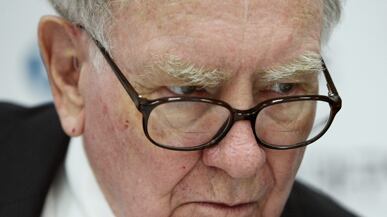Bosses as brands are not invincible any more than products as brands are invincible. But when it comes to Warren Buffett, the brand has come as close to unassailable as you can get. Exactly one year ago, a Harris Interactive survey of almost 30,000 people put Buffett’s Berkshire Hathaway at the top of its "most admired" list, beating out a field of 60 of the nation's best-known companies.

Time and again, Buffett has shown himself as a savvy guardian of his brand. No one has graced Fortune magazine’s cover as often. No one gets more airtime on CNBC. I’ve been part of the chorus myself. While in India recently, I overlapped with Buffet’s first trip to that land. Speaking to bankers who will help chart India’s financial future, I opened each of my sessions with rapturous tributes to Buffett’s wisdom and candor.
But now, with the business world abuzz over the scandal-tainted departure of David Sokol—who had been heir apparent to lead Berkshire—the question is this: Where is the Buffett presence? Where is his voice? Though Sokol took to CNBC’s airwaves to proclaim he hadn’t done anything wrong with his purchase of Lubrizol shares prior to Buffett deciding to have Berkshire buy out the company, what we know about Buffett’s own reaction comes from a letter he released asserting that nothing “unlawful” had taken place.
Yes, Buffett is to be applauded for airing details of the Lubrizol deal to the public while ensuring this wayward subordinate’s prompt exit. But where is the voice of the media savvy, eloquent, insightful, and candid boss? How was this successor candidate screened? And most crucial looking forward, what is the new succession plan for this public company—and will it be better?
Buffett must retake his familiar warm seat at TV studios, in this case not to comment on the leadership lessons for others but on his own leadership plans moving forward. Of course he does not have to share names of candidates with the public nor judge the legality of his subordinate’s actions. He must provide the accountability needed with the model he sets at the top with a genuine apology. He must explain how his new leadership succession plans will reinforce the competence and character which his investors presumed and the public has bought.
He ought to be able to do it. Among so many other business titans who deny their mortality, Buffett has shown himself as someone well aware of the need to chart a succession. The 80-year-old Oracle of Omaha knows he is not immortal. In fact, Buffet wrote in his chairman’s letter at the opening of Berkshire Hathaway’s 2007 Annual Report:
Buffett must explain how his succession plans will reinforce the competence and character which his investors presumed and the public has bought.
‘I've reluctantly discarded the notion of my continuing to manage the portfolio after my death— abandoning my hope to give new meaning to the term 'thinking outside the box.'"
I have witnessed his earnest public commitment to leadership continuity firsthand. At a 2007 panel of CEOs, Warren Buffett asked Amazon.com founder Jeff Bezos, Wipro founder Azim Premji and News Corp. CEO Rupert Murdoch to address their succession plans—and was met with virtual silence.
Murdoch, now 80, was questioned about this at an annual shareholders meeting in Adelaide eight years ago and replied that his retirement plans had been “put on hold forever” and that he would have to be “carried out,” citing the recent birth of his second daughter to his third wife and boasting of his low cholesterol. Then there’s 87 year-old Viacom CEO Sumner Redstone, who has often insisted that he “will live forever.”
Society seeks brands intentionally—whether it is children’s toys, fashion apparel, websites, or business leaders. Society’s motives for branding are to comprehend complex sprawling institutions in volatile scary times by personifications they can understand in human dimensions. Brands are a shorthand—a symbol of safety, accountability, quality, fairness, and distinction. Buffett cannot provide such brand reassurance through a scandalized successor as a surrogate for his own presence. Surely even BP’s fallen CEO Tony Hayward and Toyota’s media shy CEO Akio Toyoda learned this last year when their efforts to hide behind the pleadings of subordinates fell flat. Despite BP’s massive self-congratulatory image advertising and frequent CEO soapbox orations, when unpleasant realities surfaced, the CEO went into the bunker. Buffett is not infallible and his hiding in the bunker does not make him appear stronger, wiser, or accountable.
Jeffrey Sonnenfeld is a senior associate dean and Lester Crown Professor in the practice of management at Yale University’s School of Management. He is the author, among other works, of “The Hero’s Farewell: What Happens When CEOs Retire.”






